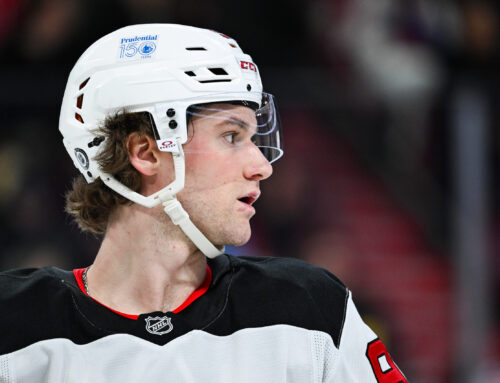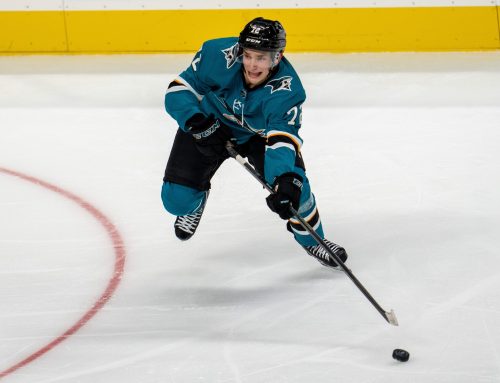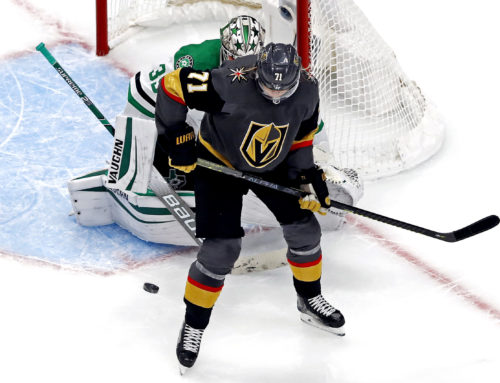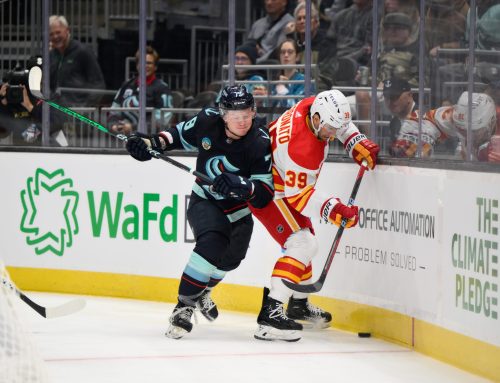
With the Oilers seemingly on the rise, we take at the depth scoring they will need for the team to get back into playoff conversations. We also show some love to a few lesser known names in New York and Washington who have been producing recently (past three games). Next week we’ll review lines that have had a great 2017, and those that should see some improvement in 2018. As always, if you’re looking for the latest line combinations or injury updates, follow me on Twitter @BrennanDeSouza!
Andre Burakovsky – Brett Connolly – Lars Eller
Team ES Point Production: 12 | Line ES Point Production: 6 (50% of team) | CF%: 52.33
When thinking of offensive production on the Washington Capitals, Alex Ovechkin, Nicklas Backstrom, Evgeny Kuznetsov, and TJ Oshie are the first names that come to mind. However, their third line has been stepping up in the team’s last three games and could provide stretches of offensive output throughout the season.
Andre Burakovsky is certainly the most intriguing member of this line and was expected to take a big step forward this season as part of Washington’s talented top six. Unfortunately, a broken thumb caused him to miss 20 games of the season and coach Barry Trotz has opted to ease him back into the lineup with third line minutes. Despite averaging 14:25 of ice time on the season, Burakovsky has seen more than 14 minutes on the ice only once in eight games since returning. At 22 years of age, the 87 points he totalled in 57 games with the Eerie Otters (2013-2014) have fans hoping he’ll continue to develop and become an integral part of the Caps’ future. As good as this line has been in recent games. Burakovsky’s value sees a huge increase if he’s skating alongside Nicklas Backstrom or Evgeny Kuznetsov.
Lars Eller has been remarkably consistent. Unfortunately, consistently finishing with less than 30 points isn’t the type of consistency that gets rewarded in fantasy hockey leagues. In his first season with the Capitals (2016-2017), Eller was seeing 13:44 of ice-time with barely any of it on the power play (0:10). Fast forward to this season and both those numbers are up. Eller is now seeing 15:10 of ice-time and a whole minute on the power play! While this isn’t ideal usage,
It has put Eller on track for a career season. As I mentioned in the opening lines, Eller could provide stretches of offensive production throughout the season. So, a quick spot start to steal the face-off wins category might also come with a couple of points.
When is a high shooting percentage a cause for concern? When it’s higher than a player’s age. Brett Connolly is 25. His shooting percentage is 31.8%. While he’s ‘on pace’ for 18 goals this season, he only has 22 shots in 28 games so far. Such a low shot volume rarely leads to such a high number of goals. Another stat that screams regression is his IPP. In previous seasons, Connolly was getting a point on around half of the goals scored while he was on the ice. This season, he has gotten a point on 90.9% of goals scored while he’s on the ice. With all the numbers pointing at regression, averaging only 11:22 of ice-time this season certainly doesn’t help going forward.
Drake Caggiula – Ryan Nugent-Hopkins – Patrick Maroon
Team ES Point Production: 24 | Line ES Point Production 8 (33% of team) | CF%: 59.74
While this line has only seen 37:46 of ice-time together this season, the small sample size has yielded extremely promising results. In their time together, Caggiula, Nugent-Hopkins, and Maroon have generated 28 scoring chances compared to the 12 they’ve allowed. Of those 28 scoring chances, 17 of them have been in high danger situations, so they’re putting themselves in good positions to score.
In 2011, Ryan Nugent-Hopkins was drafted first overall. Since then, he’s never broken the 60-point barrier. While injuries and a lacklustre supporting cast can justify his underwhelming production, he’s only 24 and still has room to grow. With the arrivals of Connor McDavid and Leon Draisaitl, Nugent-Hopkins has seen less usage, but fortunately a decrease in ice-time has come with more favorable matchups. While the opposition deploys their best checking line and defensive pairing to shut down McDavid and Draisaitl, Nugent Hopkins has more room to create offense. His ability to provide depth scoring going forward will have a great impact on any chance Edmonton has of making the playoffs.
In his final season with the University of North Dakota, Drake Caggiula totalled 51 points in 39 games, making him an intriguing addition to the Edmonton Oilers. While he is yet to produce at the NHL level, he has made progress since last year, his first season in the big leagues. Caggiula has shown flashes of his offensive abilities, but at the young age of 23, he still needs time to develop and reach his full potential. Expect him to improve on the 0.30 points per game pace he set last season, but temper your expectations because he’s only seeing 13:50 of ice-time.
For a while it seemed like Patrick Maroon held the most permanent spot alongside Connor McDavid, but as a team struggles their line combinations tend to get tossed in a blender. While Maroon is only on pace for 21 goals this season (compared to the 27 he totalled last season), he is doing a good job of putting the puck on net, and is currently on track for a career-high in shots (207). Keep an eye on his production in the next few games to establish a larger sample size and judge his value away from McDavid, as a member of this line.
Paul Carey – David Desharnais – Jimmy Vesey
Team ES Point Production: 24 | Line ES Point Production 8 (33% of team) | CF%: 43.08
When comparing this line to the other three on this list, you’ll notice their CF% is pretty low. A line with a good CF% is directing more shots at the net than their opposition, logic would tell you that more shots leads to more goals. As a line, Carey, Desharnais, and Vesey have an on-ice shooting percentage 17.65%, while this number would usually hint at regression, their low shot volumes turn that all but guarantee a decrease in production going forward.
I got to see a lot of David Desharnais on the Montreal Canadiens, and I have to say he passed the puck an awful lot, almost to a fault (definitely to a fault). While playing on the Habs, a lot of his points came from setting up Max Pacioretty, who is a substantial upgrade from Jimmy Vesey and Paul Carey. While Desharnais is currently on a hot stretch with five points in his last six games, he had seen an increased role as a concussion kept New York’s top center Mika Zibanejad out of the lineup. Considering how deep the center position is in fantasy hockey leagues, a 40-point player like Desharnais is nothing to drool over.
After totalling 144 points in 128 games for Harvard University, I remember a lot of hype surrounding which NHL team Jimmy Vesey would sign with. Considering he’s still only 24 and currently seeing limited ice-time (13:43), it wouldn’t be fair to call him a bust just yet. While he might still have a bright future ahead, his short-term value is virtually non-existent, unless you need a 30-point player on your roster.
To do a quick review, David Desharnais is a player I might add for a game or two (against my better judgement), Jimmy Vesey is a player who might be valuable in the future, and Paul Carey is a player who you shouldn’t own. The only situation in which you can justify owning Carey is if you wanted to make your team name “Carey Me Home” and a Carey Price owner wasn’t open to trade talks. I would bring up some statistics to further dissuade you from owning Carey, but his 0% ownership in Yahoo! Leagues reminds me that isn’t an issue.
One Comment
Leave A Comment
You must be logged in to post a comment.





 FLA
FLA CHI
CHI NYR
NYR PIT
PIT L.A
L.A COL
COL CAR
CAR OTT
OTT TOR
TOR NYI
NYI
 MIN
MIN BOS
BOS WSH
WSH

I agree regarding Rangers line but Carey can shoot the puck he’ll just never get enough opportunity to be a prominent scorer.